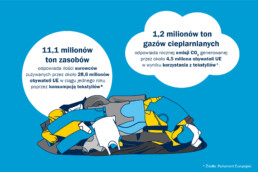
Recycling is about conserving resources: Interzero has saved primary raw materials equivalent to the textiles consumed by 28.6 million EU citizens
Fraunhofer UMSICHT study shows positive environmental impact of recycling Interzero saved approximately 1.2 million tonnes of greenhouse gases and 11.1 million tonnes of primary resources in 2023. Europe's leading provider of closed-loop solutions is developing textile recycling, the potential of which provides incredible support for the protection of our climate and natural resources.
Berlin/Cologne
More recycling, less waste of resources: Recycling of raw materials is an effective lever against the exploitation of our planet and prevents further escalation of the climate crisis. This is evidenced by the results of the "resources SAVED by recycling" report published by Interzero: Europe's leading provider of closed-loop economy services, Interzero prevented a total of 1.2 million tonnes of greenhouse gas emissions in 2023 by recycling around 2.5 million tonnes of recyclable materials. This corresponds to the annualCO2 emissions generated by 4.5 million EU citizens through textile consumption alone. At the same time, Interzero and its customers were able to save more than 11.1 million tonnes of primary resources. This amount is comparable to the amount of raw materials consumed by around 28.6 million people in the EU in one year through textile consumption*.
"When we look at the potential for textile recycling, it becomes clear that it has huge environmental potential - this also shows how important it is to accelerate the transformation of the economy to a circular model at all levels." says Dr Axel Schweitzer, CEO and partner of Interzero. "This applies in particular to recyclable materials that are not yet consistently subjected to this process."
"We want to close the textile circuit in cooperation with the industry and use our experience as an established system service provider to develop a holistic concept for collection, sorting and recycling." - says Dr. Axel Schweitzer. "In this way, we are relieving the burden on the environment and helping companies to position themselves in a closed loop, i.e. in a sustainable and competitive way."
In contrast to the recycling of other products (e.g. packaging), in terms of technology and development, textile recycling is still in its infancy: Every year, around 92 million tonnes of textiles are discarded worldwide. So far, only one per cent of this huge material flow goes into fibre recycling and thus back into the production cycle.
The greatest pressure is currently coming from time - new EU legislation, such as the separate collection obligation or the envisaged producer responsibility for textiles (EPR), will already come into force in 2025; pressure on producers is also coming from regional governments - the German government's national strategy for a circular economy (NKWS) is an example.
Education as a key element in conscious transformation
For more than 15 years, Interzero has ensured that the environmental impact of recycling has been independently and scientifically verified in order to inform, educate and make a solid case for the economic transformation towards closed-loop recycling. The annual environmental performance report published by the Fraunhofer Institute for Environmental, Safety and Energy Technology (UMSICHT) reflects the long-term effect of Interzero's work - and helps our customers to communicate transparently about sustainability. For its comprehensive commitment to this cause, Interzero was awarded the German Sustainability Award 2024 in the category of waste management and recycling, as well as a special award in the field of resource transformation.
About Interzero
Interzero is a European leader in environmental protection and the circular economy. It introduces innovative solutions to its customers that increase the efficiency of raw material use and minimise the adverse impact of companies on the environment. Interzero specialises in the closing of raw material cycles and comprehensive recycling services, environmental consulting and environmental education. The company designs and implements solutions in the spirit of the circular economy, preventing the waste of raw materials and optimising waste management. Interzero's experts support entrepreneurs at every stage: from the optimisation of recovery and recycling processes, through audits and training, to the implementation of composting machines, bottle machines and remotely managed waste bins. All of these activities facilitate the implementation of changes towards a modern, closed-loop economy.
*These comparisons are based on data from the European Parliament.